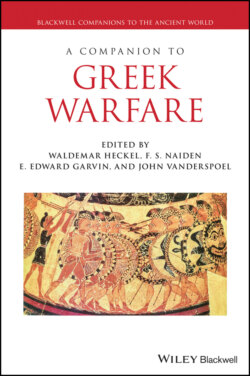Читать книгу A Companion to Greek Warfare - Группа авторов - Страница 54
Indigenous ambitions for power
ОглавлениеA significant moment in indigenous history was the uprising of Ducetius, an autocrat of native origin, in the mid-fifth century. Conflicts with Catane led to his alliance with Syracuse and to a joint victory over Catane (Diod. Sic. 11.76.3). Encouraged by this success, Ducetius turned against the city of Morgantina and organized a federation of independent Sicel communities challenging Greek supremacy. Next to a sanctuary for the indigenous Palici, he founded the city of Paliké as capital of the federation (Diod. Sic. 11.88.6). After various minor successes, the tide turned when he attacked the so far unidentified hilltop site of Motyon, manned by a garrison from Acragas (Diod. Sic. 11.91). After the combined forces of Syracuse and Acragas destabilized the federation, the Sicels turned against Ducetius, who fled to Syracuse and surrendered all land under his rule (Diod. Sic. 11.92).
While the rhetoric attributed to Ducetius regarding the sanctuary of the Palici suggests a certain ethnic self-awareness and “pan-Sicel” aspirations, his strategy resembled those carried out by the Syracusan tyrants, the expansionist Deinomenids. Ducetius aimed to create a stable power in the hinterland, as proved by his early moves against Morgantina and Motyon, and sought allies among independent communities for this purpose. The synteleia of communities, however, did not act cohesively under one leader, as some communities remained independent and most Sicel allies disagreed with his decisions in the wake of his assault on Motyon. Ducetius found refuge and forgiveness, not in his Sicel hometown, but in Syracuse, which exiled him to Corinth.
Upon his return to Sicily in 446, Ducetius founded the city of Kale Akte, on the northern shore of Sicily, with the consent of Corinth and Syracuse (Diod. Sic. 12.8), but died soon after in 440. Syracuse consequently regained control over all insurgent communities and perhaps destroyed the Sicel center of Trinacria, sometimes identified with the Ducetian foundation Paliké (Diod. Sic. 12.29). In sum, Ducetius was not a freedom fighter for the indigenous Sicilian cause, but an opportunist who became a major figure in Greek historiography. His attempt to gain political power is nevertheless the sole instance when non-Greeks cooperated in order to claim hegemony in Sicily.6
